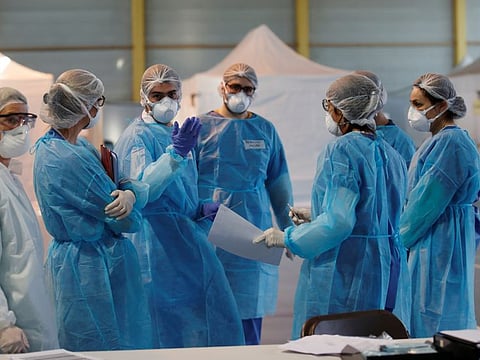Coronavirus: UAE hospitals band together to mitigate stock shortage
Production lag, flight suspensions and clearances all affect supply

Dubai: UAE private hospital groups are expecting a five- to six-fold increase in their use of personal protective equipment (PPEs) for every coronavirus patient that comes in, and some say they don’t have enough in stock.
Masks, gloves, goggles and gowns that are essential to keeping the frontline of health workers not only safe from infection, but also safe from transmitting the virus to others, are predominantly made in China where there remains a lag in supply.
China shutdown
“Actually there’s a global shortage and it’s difficult to get supplies,” said the procurement head of a major private hospital chain, speaking to Gulf News on the condition of anonymity. “China is producing 82 per cent of global production of PPEs and they have been shut down for more than a month and a half.
“They’ve just resumed transporting goods but in the likes of Europe and the US there is a big demand and they have bought a lot, so China has a difficulty to supply. I was able to secure a few boxes or containers, but now it’s difficult to import due to logistical issues.”
Stefan Sickel, the senior director of supply chain at Mediclinic Middle East agreed, “There are two areas; supply versus demand of factories being able to produce and the availability of space on cargo planes.”
Flight suspensions
Both said that PPEs were usually flown in on passenger planes but since the UAE suspended all arrivals and departures including transit for two weeks from March 19, they were now fighting for space on cargo flights where heavier foodstuffs take priority.
“We cannot find freight capacity to bring the goods in and we will very soon need the assistance of the Dubai Health Authority to work on a plan to alleviate and mitigate any risk of shortages,” said the anonymous source.

In response to some hospital chains reporting they only had a few days-worth of stock left in supply, Sickel replied, “Mediclinic is fortunate that we have planned ahead and have longer supplies, but we are really ramping up especially when it comes to PPEs in anticipation of something we don’t really know what to expect.”
Sickel also said UAE healthcare providers were looking at joint ventures to ensure PPEs were more readily available.
Clearances
A third issue faced by private hospitals is the time it takes to obtain port clearance once shipments arrive.
“Delays are counted in days not weeks, it’s just a few days more but when there’s a crisis it’s pretty important to have smooth and quick customs clearances,” said the anonymous source.
Sickel explained the reasons for this were as follows, “Obviously they are inundated with the number of products coming in and they are taking careful measures to ensure that any products coming in are not contaminated in any way and are taking precautions based on differing reports of how long the virus can stay on surface areas.
“We know they are decontaminated in the places of origin and when they arrive, and this extra time is taken by the authorities to clear these goods. There is an impact for sure, but they know that when critical supplies come in that they get the attention over and above stocks that are not critical.
“To cut a long story short, delays are there but we are working with authorities to mitigate that wherever we can.”

What about ventilators?
PPEs are just one aspect of the crisis and another is the shortage in ventilators. The anonymous source said, “Ventilators are not manufactured in the UAE so we rely on big brands made in China and Europe, but in those countries there is a complete shortage because of the need of their own populations. I personally don’t have a solution but I would assume the UAE’s Ministry of Health and Prevention (MoHAP) could assist in facilitating the conversation and negotiation in those countries. There is some discussion to nationalise these companies for a short period of time. That hasn’t happened yet but it’s one of the possibilities being discussed.” Stefan Sickel added, “There is a certain amount of ventilators we keep for normal everyday cases. We have them in stock and they are not yet fully utilised. We know the government have a certain spare capacity, but if the situation reaches a critical level they are not readily available in the UAE. Again this is something we are working on to see how we can get more in and given the global surge and demand in all of this – that is above normal – it will be very difficult to get a hold of them.”
Sign up for the Daily Briefing
Get the latest news and updates straight to your inbox







